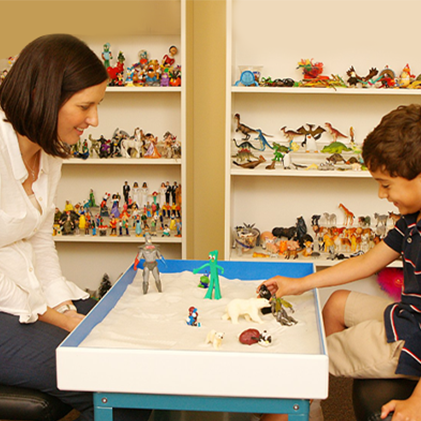My Services

Cognitive Behavioral Therapy (CBT)
Our thoughts, feelings, and behaviors are interconnected, and by changing one, we can positively impact others. Cognitive Behavioral Therapy (CBT) is a goal-oriented, evidence-based approach to therapy that focuses on changing negative thought patterns and behaviors. CBT is highly effective for treating a wide range of mental health conditions, including anxiety disorders, depression, and PTSD. Through CBT, individuals can learn to identify negative thought patterns and replace them with more positive, empowering ones.
Child-Centered Play
Therapy
Play is the natural language of children and provides a safe, supportive environment for them to express themselves and work through emotional issues. Through play therapy, children can learn to develop greater self-awareness, emotional regulation, and social skills. Play therapy can be used as a primary intervention or as adjunctive therapy for social, emotional, and behavioral disorders. Additionally, supporting a wide variety of psychological disorders including:

- Anxiety
- Academic and Social Development
- Anger Management
- Attention-deficit/Hyperactivity Disorder (ADHD)
- Autism
- Conduct Disorder
- Crisis
- Depression
- Divorce
- Grief and Loss
- Obsessive-Compulsive Disorder (OCD)
- Oppositional Defiant Disorder (ODD)
- Psychical and Learning Disabilities
- Trauma

Sand Tray Therapy
Sand tray therapy is a form of therapy that uses a tray filled with sand and miniature objects to create a three-dimensional world that reflects the inner experiences of the client. This approach is particularly useful for individuals who have difficulty expressing themselves verbally. Through sand tray therapy, individuals can explore and process their emotions in a safe, non-judgmental environment. Sand tray therapy is effective for treating a wide range of mental health conditions, including anxiety, depression, and trauma.
Dialectical Behavior Therapy (DBT)
DBT can be highly effective for individuals who struggle with emotional dysregulation, impulsivity, and difficulty in relationships. It provides practical strategies for managing intense emotions and improving overall quality of life. Dialectical Behavior Therapy (DBT) is a form of therapy that combines cognitive-behavioral techniques with mindfulness practices. Through DBT, individuals can learn to develop greater self-awareness, emotional regulation, and interpersonal effectiveness. DBT is particularly effective for treating conditions such as borderline personality disorder, eating disorders, and substance use disorders.


Eye Movement Desensitization & Reprocessing (EMDR)
EMDR therapy is an evidence-based approach to treating trauma and other distressing life events. EMDR works by using bilateral stimulation (such as eye movements, sounds, or taps) to stimulate the brain’s natural healing processes. Through EMDR therapy, individuals can process traumatic memories and reframe negative beliefs that have developed as a result of those experiences. EMDR is highly effective for treating conditions such as PTSD, anxiety, and depression.
Acceptance & Commitment Therapy
Acceptance & Commitment Therapy (ACT) is a mindfulness-based approach to therapy that focuses on helping individuals develop greater psychological flexibility. ACT is based on the premise that psychological suffering is caused by attempts to avoid or control uncomfortable thoughts and feelings. Through ACT, individuals can learn to develop greater acceptance of their thoughts and emotions while also taking committed action toward their values and goals. ACT is highly effective for treating a wide range of mental health conditions.



